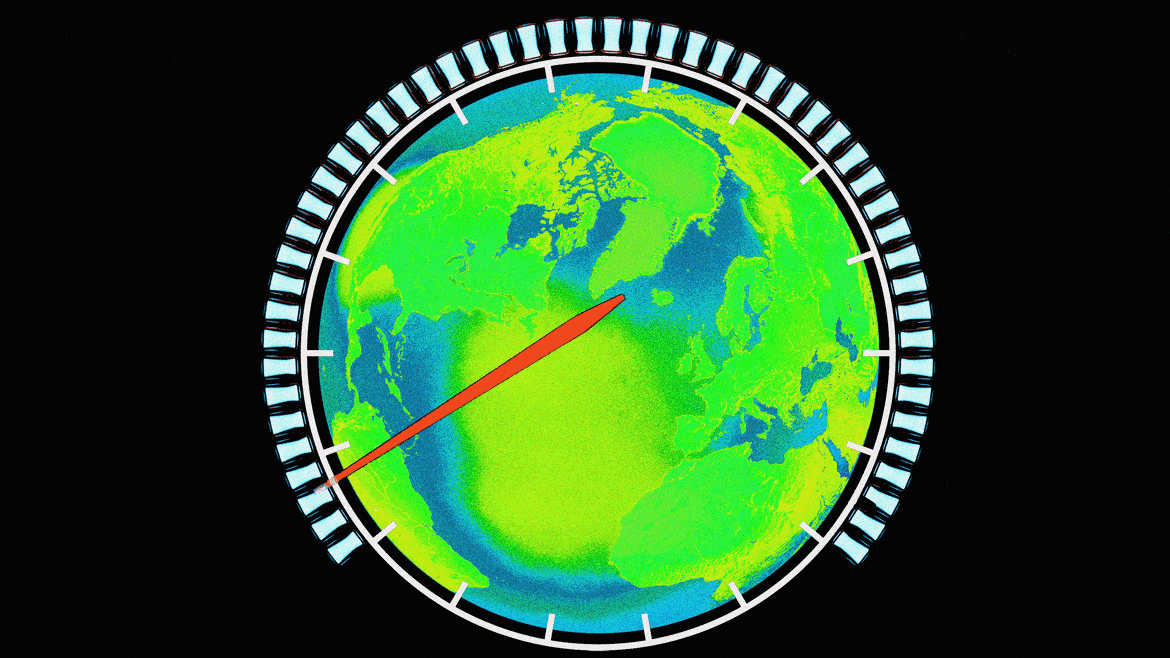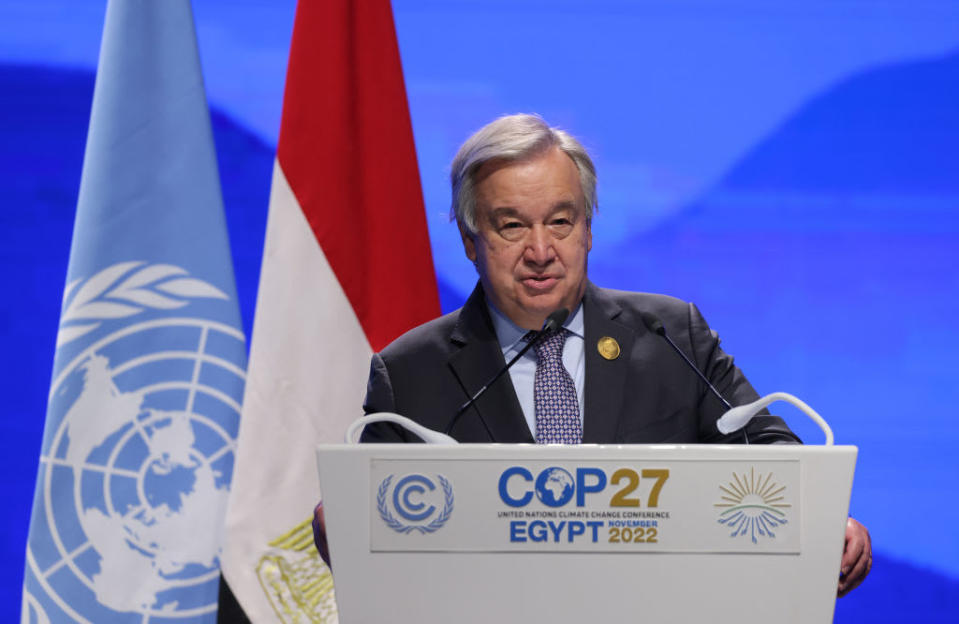What Happens When Even Scientists Get Doom-Pilled?

- Oops!Something went wrong.Please try again later.
- Oops!Something went wrong.Please try again later.
The U.N.’s yearly climate summit COP27 kicked off this week in Sharm el-Sheikh, Egypt with a shockingly bleak message from Secretary General António Guterres: “We are in the fight of our lives, and we are losing. Greenhouse gas emissions keep growing, global temperatures keep rising, and our planet is fast approaching tipping points that will make climate chaos irreversible.”
To underscore his dire point, he added, “We are on a highway to climate hell with our foot still on the accelerator.”
If that weren’t bleak enough, in the lead up to COP27, the U.N. also released a report that plainly stated that there is now “no credible pathway” to achieve the lofty goal of keeping global temperature rise below 1.5 degrees Celsius (though the 2 degrees C goal is still within reach). There would need to be a radical transformation of society in order for this to happen, the report said.
So, we’re all on the Death Star right now. We all know about the vulnerability with the exhaust port but nobody seems to want to fix it—and the Rebels are on their way.

UN Secretary General António Guterres makes a speech at the opening of COP27 on Monday: “We are on a highway to climate hell with our foot still on the accelerator.”
If you think that this represents a stark shift in climate messaging—from one of optimism and hope to one of unavoidable death and destruction—you’re not alone. The trend of climate doomerism has been on the rise in recent years, typified by a bleak outlook and general hopelessness when it comes to climate change news. Instead of believing that we can do something to prevent climate disaster, doomers believe that there’s no hope—especially since world leaders have shown time and again they’d rather kowtow to the fossil fuel industry.
There are even whole ecosystems of the internet dedicated to doomerism from Twitter communities, to podcasts, and even to the good old-fashioned blogosphere. Geoffrey McFarlen happens to be involved in all three branches. The self-described climate activist is also the founder of the Doomer’s Cafe blog and podcast of the same name. Both are meant to voice “unpleasant truths into the realm of public discourse” when it comes to climate change, he said.
To him, there are essentially two kinds of conversations surrounding climate change. First, there’s the established one where conservatives on the right deny or downplay the existence of the climate crisis and refuse to do anything; and liberals on the left say that there’s plenty of cause for concern, but believe it can be easily fixed through initiatives like transitioning away from fossil fuels to renewable energy.
The other conversation is more grim: “A very small but growing community that realizes that policy emerging from either mainstream view will invariably lead to societal collapse and/ or extinction of the human race,” McFarlen told The Daily Beast. “These are the climate alarmists, pejoratively referred to as doomists or doomers.”
It’s easy to see why doomerism has been so pervasive when it comes to discourse surrounding climate change. Scientists have been harping on the exact same issues for decades only to see their warnings decried as a cynical political ploy in order to scare up votes for Democrats. A misinformation industrial complex of climate denialism has emerged dedicated to maligning and discrediting facts and data provided by scientists.
Now, in 2022, a new generation of people are growing up seeing that—no matter how hard they try and how much data they provide to show that climate change is here and wreaking havoc—the powers that be simply do not care. And any efforts from these leaders to show that they might care comes up woefully short.
Take COP27 for example. Not only do many climate activists like Greta Thunberg see the conference as cynical, virtue signaling greenwashing event led by wealthy nations, but the event is also rife with hypocrisy. For example, the summit drew a lot of criticism due to the fact that it’s sponsored by Coca-Cola—the world’s leading plastic polluter.
In light of this, it makes sense that more and more people are going full on doomer. But climate scientists, thick in the muck of the data that tells us things are getting worse and worse, have historically also been some of the more optimistic voices emphasizing that it’s not too late for us to act. What does it mean when experts start saying the quiet part out loud: We might be completely fucked when it comes to climate change?
Should Wealthy Carbon Emitters Foot the Bill for Climate Damage?
They’re not likely to admit it—at least not publicly. “No scientist I know wishes to be labeled a doomer,” McFarlan said. Instead, most will hedge by pointing out that most of the worst issues facing Earth can be avoided by transitioning to renewables. But McFarlan claims they’re quietly feeling it too.
In fact, the doomer label might really just be a matter of perspective, even when it comes to to problems that are putting us on that proverbial highway to climate hell. “There is no doomerism, simply realism,” said Bill McGuire, a climate scientist at University College London, and author of Hothouse Earth: An Inhabitant’s Guide. “A 1.5-degree C global average temperature rise is rightly equated with the dangerous climate change guardrail.”
Though he bristles at the doomer label, that doesn’t mean McGuire minces his grim outlook of the future. It might not be full-blown doomer but it’s certainly doomer adjacent. “In order to stay below 1.5 C, emissions need to fall by 45 percent in the next seven and a bit years,” he explained. “This is now practically impossible, so the world is now committed to dangerous, all-pervasive, climate breakdown.”
Much of doomer discourse could also be seen as an evolution from climate misinformation into another cynical way to create excuses for ravaging the Earth. After all, if everything is hopeless and there’s no point, why not just continue to raze the rainforests for cattle grazing and drill for oil in the Arctic?
This can create a sense of complacency. It’s learned helplessness at its most extreme and consequential. Sure, it’s great for lining the pockets of fossil fuel executives—but it’s life-threatening for all of us.
“Anecdotally, I have noticed a pretty sharp shift in the comments I receive in response to climate change communications from the usual climate misinformation and trolling remarks to now climate doomerism,” Zachary Labe, a climate scientist at the National Oceanic and Atmospheric Administration and the Atmospheric and Oceanic Sciences Program at Princeton University.
If you talk to any climate scientist, though, most of them will tell you while things can most certainly get worse, there is still a lot of runway to avoid complete and utter disaster. In fact, doomer messaging obfuscates the reality that we can do something about this—but we all have to do it together. If we fall prey to doomerism, then we might let everything burn down for no good reason at all.
Green Hypocrisy Hangs Over This Year’s U.N. Climate Meeting
“The risk is that if people really feel like there’s nothing to be done, and we’re already on the ‘highway to hell,’ then what’s the point of doing anything? Just let it all burn, baby,” Andrew Dessler, the director for the Texas Center for Climate Studies at Texas A&M University, told The Daily Beast. “That’s clearly the risk. It’s reasonable when people say that that kind of rhetoric doesn’t motivate people to act in ways that are effective at reducing emissions.”
Nor does Dessler believe that such a pessimistic approach is accurate. Yes, things are bad—but they aren’t as bad as people necessarily make out. Sure, we’re on the highway to hell now and the road is getting rough, but at least we still have our hands on the wheel.
“I am quite convinced that we still control how bad it’s going to be,” he said. “We control whether we’re on the ‘highway to hell’ or not. There’s a lot of positive news in the energy world, and that we just need to build on that.”
Got a tip? Send it to The Daily Beast here
Get the Daily Beast's biggest scoops and scandals delivered right to your inbox. Sign up now.
Stay informed and gain unlimited access to the Daily Beast's unmatched reporting. Subscribe now.

